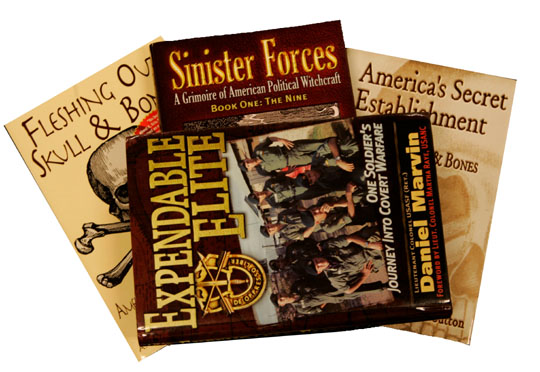
http://www.registerguard.com/news/2005/12/18/f1.bz.publisher.1218.p1.php?section=business

Kris Millegan runs Trine Day Press out of his home near Walterville. The press is being sued by the Special Forces Association, a fraternal group that disputes stories told in a Vietnam memoir by retired Air Force Lt. Col. Daniel Marvin.
Soldiers association sues independent publisher over
Vietnam book
BATTLE FOR
A WAR STORY
By KAREN MCCOWAN
The Register-Guard
WALTERVILLE - A tiny publishing house here is in the cross-hairs of a $700,000 lawsuit backed by the Special Forces Association, a fraternal organization for current and former U.S. military special operatives.
On the one side are Kris Millegan's Trine Day Press and one of its authors, retired U.S. Air Force Lt. Col. Daniel Marvin, who have been targeted in the case. On the other are seven men who served with Marvin in Vietnam during 1966 and 1967.
They contend that Marvin's book "Expendable Elite: One Soldier's Journey Into Covert Warfare," provided a "false, libelous, defamatory, embarrassing and humiliating" account of their activities at An Phu near the Cambodian border. They seek $100,000 each in general, special and punitive damages.
Millegan said the case already has racked up nearly $50,000 in legal expenses, and it could bankrupt his small press, which has published just eight books and sold a total of 40,000 copies since its creation four years ago.
But he declined to agree to the men's demand that he reissue the book as a work of fiction. He stands by Marvin's account, saying that some of the defendants verified it on tape at Marvin's request after he sent them early drafts in 1988.
"I have audio tapes from the people who are now suing me, not only confirming Col. Marvin's story, but saying he could use their names," Millegan said.
His willingness to challenge the lawsuit has won admiration from other small, independent publishers, said Teresa Kao, owner of Our Town Publishing in Portland and
former president of the Northwest Association of Book Publishers.
"Small publishers typically can't afford to carry liability insurance," Kao said. "If someone decides to sue you, there just isn't money for this sort of thing.
"Too often you see people say, 'I'll take this book off the market if you'll make this lawsuit go away,"' Kao said. "But Kris sees this really as a kind of quest. He is just going ahead with it because he believes it needs to be done."
A South Carolina U.S. District Court jury began hearing the case on Halloween day, but a mistrial was declared two days later after one of the plaintiffs' attorneys suffered a medical emergency.
Judge David Norton has scheduled a new trial to begin Jan. 23.
In their opening statement, the plaintiff's attorneys, Ben and Bobby Deaver, acknowledged the audio tapes, but say their clients thought they were being asked to "vet" a work of fiction.
At particular issue are Marvin's contention that he was assigned to assassinate Cambodian Crown Prince Norodum Sihanouk; that he commanded some of the men in an operation that involved firing into neutral Cambodia (which the plaintiffs say would have been a violation of international law); and that the men supported Marvin's refusal of a direct order to leave An Phu (which they contend would have constituted mutiny). In Marvin's account, the defiance was to protect their partners in the mission, a local militant Buddhist sect.

"Tame" by comparison
"Expendable Elite" is hardly the most outrageous book in Trine Day's list.
"It's tame compared to a lot of the stuff I publish," Millegan said.
Consider "Sinister Forces," which ties the Salem witch trials, the Manson murders, the CIA and the Kennedy assassinations to a Satanic plot. Or "Fleshing Out Skull and Bones," which links the Yale secret society — whose members include President Bush and Sen. John Kerry — to world-wide drug smuggling.
Before the first trial was aborted, Millegan acknowledged under questioning by the plaintiffs attorneys that he had published "Expendable Elite" only after it had been rejected by more than 100 other publishers.
They also elicited testimony that he believes a CIA "Operation Mockingbird" had infiltrated the U.S. news media and publishing houses to prevent would-be whistle blowers from alerting the public.
In court, Ben Deaver presented a very different picture of the An Phu activities of clients William B. Tuttle Jr., Raymond J. Johnson, George H. Kuchen, John E. Strait, Richard Sirois, William Menkins and James A. Taylor than that of the book.
He described the outpost as a "pacified area" where the men did civil affairs work building schools, infrastructure and providing medical treatment.
Why then, did some of them send affirmative written or tape recorded feedback to Marvin's manuscript?
They respected him as a former commander, Bobby Deaver told the jury in his opening statement. "And then, because they thought this was a novel, a couple of them said, 'Yeah, you can use my name if you want to."'
The Deavers also submitted a deposition from Tuttle, Marvin's former superior officer, now too medically fragile to testify in court In it, Tuttle denies the covert operation Marvin describes, saying, "I didn't even have authority to authorize anything like that."
It's not surprising he would say that, Marvin testified in reply. When he accepted the mission, he said, he was told the Air Force would deny knowledge of it. Marvin said he only broke his own promised silence because his conscience bothered him after a religious conversion.
"In 1984, 1 came to know the Lord as my personal savior," he said. "And that day is the day I started writing this book. Because I no longer feared the company sending somebody like me, a trained assassin, to kill me for telling the truth."
Fighting over the truth
In some respects, the cleancut, bom-again Christian Air Force veteran is an odd bedfellow for Millegan, a pony-tailed "old hippie" and one-time guitarist with the band "Powertrain."
Millegan operates out of an old farmhouse and barn not far from the Walterville store.
He considers, researches and edits the manuscripts while outside contractors handle design, copy editing, printing and distribution.
He works in an attic office stuffed to the rafters with books about U.S. history, military operations and spy agencies.
He displays old photographs that appear to verify his story of growing up in Fairfax, Va., and Indonesia while his father served as CIA branch chief for Southeast Asia.
"Dad didn't tell us about it then," he said. "But he told me in 1969, when I was 19, that the Vietnam War wasn't about fighting communism, but about protecting access to drugs, and that these secret societies were behind it all. I thought he was nuts, that this was his way of having a 'drug talk' with me."
Millegan began to seriously examine his father's claim, however, after hearing revisionist historian D. F. Fleming talk about the origins of the Cold War. He began his own research into allegations of CIA and Skull and Bones Society involvement with drugrunning.
By the 1990s, he had decided to make a mission of exposing secret societies and agencies.
"Their secrecy and our Republic don't mix," he said.
With this lawsuit, however, he's having to put his money where his mouth is. After two profitable years, legal expenses have pushed Trine Day into the red, he said. Fortunately, he isn't literally betting the farm where he lives with his wife and children: The property is owned by members of her family.
Kao, the Portland publisher, said she believes the Special Forces Association simply wants to "cut off the flow of information."
"They've intimidated much bigger fish," she said. "The message is, don't mess with them, or they'll go after you."
Indeed, in its first letter to Millegan threatening legal action in August 2003, the Special Forces Association referred him to Time/Warner or CNN, should he doubt the group's "resolve when the truthfulness of U.S. Special Forces combat operations is at stake."
The letter referred to the association's swift and vociferous response to a 1998 CNN/ Time magazine report alleging that the U.S. military used nerve gas to kill American defectors in Laos in another Vietnam-era mission known as Operation Tailwind.
The group's protests and those of Pentagon officials led the television station and magazine to retract the story and fire the reporters and producers involved.
Roger Simmons, who represented fired, award-winning, CNN producer April Oliver, charged last month that the network caved to pressure that it would lose crucial access to Pentagon officials unless it disavowed the story, and that no one has yet proved in court that the story was false.
"So far, the only court decision that's looked at that case has exonerated their reporting," he said.
In its official retraction, CNN said the original report came from personnel involved in the Tailwind Operation, but that a subsequent independent investigation led by media attorney Floyd Abrams concluded that the story "cannot be supported."
In the "Expendable Elite" lawsuit, even the judge seemed to expect that there would soon be a court decision about the truth or falsehood of the story.
While discussing a new trial after declaring the mistrial last month, Norton noted that neither Marvin nor Trine Day have deep enough pockets to pay the damages sought by the Special Forces Association plaintiffs.
"If you got a verdict, they've got no money," Norton told Deaver after declaring the mistrial last month. "So looks like to me we're trying this case over who's telling the truth."
©Register Guard --Ttext & Pictures